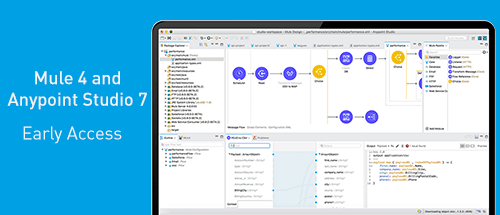Welcome to Mule Invaders, the video game inspired by the classic retro shooters Galaga and Space Invaders. In Mule Invaders, help Max the Mule destroy waves of enemies by spawning powerups using APIs. To protect Max on his journey to integrate the universe, create APIs in Anypoint Platform, deploy your application on CloudHub, then make HTTP requests to your APIs to spawn powerups while playing the game in realtime. When you use a REST client to send a POST request to your API, the flow will run and will trigger a powerup to spawn in the video game. The more powerups you trigger, the higher the score you can get.
How can I play?

This video is to install Anypoint Studio 7 and Mule 4 and see new features. I also have a small application created. One area that is still a bit weak is the download of additional jars. Right now the IDE “knows” Mule’s examples and the additional libraries to download. But I can think of a way to make this approach generic so that you can have Mule IDE download additional jars as part of creating a new Mule project from a template.
It’s super easy for anyone to build and play Mule Invaders themselves. Simply click one of the buttons below to download the application on either a PC or Mac, then follow the tutorial on how to set up the backend integration for the video game.
Anypoint Studio 7.5 Download
How was the game made?
Mule Invaders was built using the Unity game engine and written entirely in C#. The video game client polls our API Endpoint created in Anypoint Platform and listens for any updated value in the Object Store. When an Object Store value has been updated, it spawns the corresponding powerup in the video game. Pretty simple right?
If you have any feedback on Mule Invaders or have ideas of what should be added to the game next, please leave a comment below. Also, if you can get a high score, make sure to share a screenshot and tag @muledev on Twitter. Click here to get started today, you should be up and running in less than 10 minutes.
Related Posts:
While the rest of the team was still busy with Mule 3 release preparations I took some time to update Mule IDE to be compatible with Mule 3.
What’s new?
I have put most work into creating new projects from the examples that come with the Mule distribution. This feature was rewritten to match the examples layout in Mule 2.2.x as well as in Mule 3. You’ll notice that the entire example is now copied over (minus a few files that do not make sense in an Eclipse project, such as build files). If the example requires additional jar files, they will be downloaded into the project. A lib folder will be created inside the new project to host those additional jars and they will be added to the project’s classpath.
Download Anypoint Studio For Windows
Custom project templates
Custom project templates, a topic that was described in a previous blog post, will benefit greatly from the new approach described above. One area that is still a bit weak is the download of additional jars. Right now the IDE “knows” Mule’s examples and the additional libraries to download. But I can think of a way to make this approach generic so that you can have Mule IDE download additional jars as part of creating a new Mule project from a template. Speak up if you’re interested in discussing this feature.
Get it!
If you have previously installed Mule IDE from the update site you should be able to update your existing Eclipse installation. Just register a new update site location and Eclipse will detect the new version. See the Installation Guide for instructions how to install.
Anypoint Studio Download For Mac
Related Posts:
